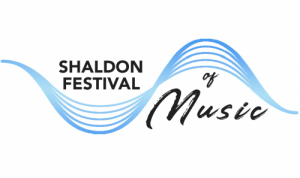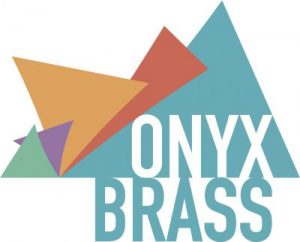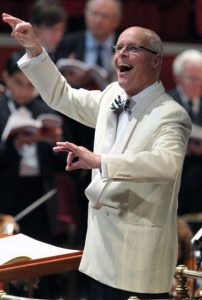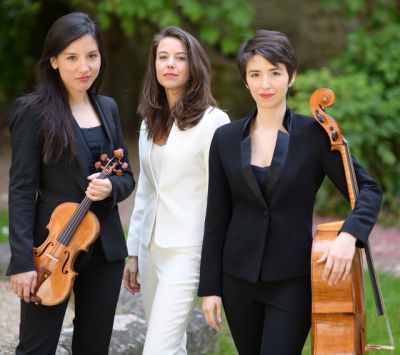Shaldon Festival 2019
Click on the past performances to jump to the information or scroll down the page.
Choral Workshop and Informal Concert directed by Brian Kay
Bath Philharmonia Free Outreach Concert
Onyx Brass
Concert
Sunday 23 June 2019
2019 Programme:
An American themed programme including:
BERNSTEIN: Fanfare for Bima
IVES: Variations on “America”
BERNSTEIN: Suite from “West Side Story”
JOHN ADAMS: China Gates
COPLAND: Three Dance Episodes from Rodeo
MAYNARD: Fanfare
HERBERT CHAPPELL: Hollywood Portraits
JACKSON: Anything But
KENNY WHEELER: 1 for 5
GERSHWIN: A Broadway Selection Bernstein
2019 CONCERT REVIEW
The final concert of the Festival was a sizzler! From the start the group created a focussed but relaxed atmosphere, introducing their pieces with a blend of information, anecdote and humour.
The concert opened with Bernstein’s ‘Fanfare for Bima’, a rousing start based on Koussevitsky’s call for his dog, and including short musical references to other composers.
Ives’ ‘Variations on America’ was originally written for organ but well arranged for the quintet and including two bitonal episodes, the first ever use of this. The group skilfully negotiated the sometimes virtuosic variations with elegant skill and their mellow sound blended beautifully in the acoustic of the church.
We were then treated to lovely arrangements of five of the favourite songs from West Side Story, Maria, Tonight, America, I Feel Pretty, and Somewhere.
A fascinating early John Adams piece, ‘China Gates’ followed, providing a minimalist piece with typical repeated kaleidoscopic patterns, with a variety of sonorities including muted sounds.
The first half ended with Three Dance Episodes from Copland’s Rodeo, in another lovely arrangement with quiet contemplative sections ending with the energetic ‘Hoe Down’ which included thigh-slapping percussion parts!
James Maynard’s short and more traditional sounding ‘Fanfare’ began the second half in ceremonial style, and led us into Herbert Chappell’s fascinating and witty portraits of Bogart, Monroe and Keaton.
Tim Jackson’s ‘Anything But’ is an Onyx commission, cleverly giving them and the audience a break from brass sounds, setting four poems and incorporating all sorts of sounds from the repeated ‘Me’ to animal noises. Brilliantly executed by the group, showing their skills away from their instruments as well as playing them.
Kenny Wheeler’s 1 for 5 is in fact two movements, ‘Pretty Little Waltz’ and ‘Anybody’s Song But My Own’, the first dark and angular and the second in a cheerfully swung jazz style.
Gershwin’s Broadway selection gave the opportunity for some lush solo sounds, muted sections and an ensemble sound that at times seemed like many more than five instruments!
The concert was incredibly well received and the audience demanded and were granted an encore. In complete contrast, this was a beautiful arrangement and performance of Bach’s chorale prelude ‘Nun Komm Der Heiden Heiland’. The Onyx Quintet are supremely competent players, and provided us with a wide range of styles and sounds within an American themed context. The deputizing trumpet player Ryan Linham (replacing Niall Keatley) was a pupil of Alan Thomas, the other trumpet player, and seemed to blend with the group perfectly. The tuba and trombone players, Amos Miller and David Gordon Shute, were our entertaining presenters as well as playing wonderfully, and Andrew Sutton’s eloquent horn playing completed the ensemble. The presentational style suited the occasion supremely well, and was greatly enjoyed by us all. We very much hope to be seeing and hearing them again before too long.
KATE HILL-ART
Onyx Brass is one of the rare breed of chamber ensembles whose musical and technical virtuosity is matched by the accessibility and vitality of their presentation. Their mission is to have their extraordinary abilities at the disposal of the music at all times, and to play music of the requisite quality to reflect the status of the brass quintet as a serious medium for chamber music. The richness and warmth of their sound is remarked upon by all who hear them.
NIALL KEATLEY: Trumpet
Niall began his musical studies at the City of Belfast School of Music at the age of nine. While at the C.B.S.M he was a member of the City of Belfast Youth Orchestra and also played with a number of Brass Bands in the Northern Ireland area. In addition Niall was principal trumpet with the National Youth Orchestra of Great Britain performing in some of Europe’s finest concert halls. Niall was awarded a scholarship to study at the Royal Academy of Music where his teachers included, Ian Balmain, James Watson and John Wallace. During this time Niall was a member of the European Union Youth Orchestra and also spent a short time with the Black Dyke Mills Brass Band. As a free-lance trumpet player Niall has performed with various orchestras including, the London Symphony Orchestra, the Royal Philharmonic Orchestra, the Orchestra of the Royal Opera House, the Royal Ballet Sinfonia and the BBC National Orchestra of Wales. In 2002 Niall performed Haydn’s trumpet concerto on BBC television with the Ulster Orchestra as part of the BBC Last night of the Proms, Proms in the Park series. As well as being a member of Onyx brass, Niall has performed with a number of chamber ensembles including, London Brass, LSO Brass, London Winds and the Wallace Collection.
ALAN THOMAS: Trumpet
Alongside his work with Onyx brass, Alan is also the Principal Trumpet of the BBC Symphony Orchestra, probably most famous for its performances in the BBC proms season and most notably the Last night of the Proms. Previous to this appointment he was Joint-Principal Trumpet of the City of Birmingham Symphony Orchestra 2004-13.
Alan studied at the Birmingham Conservatoire between 1996 and 2000 where he gained a first class honours degree. During this time he won the Shell/LSO prize, playing the Hummel trumpet concerto with the LSO in the Barbican, and won the Brass prize in the Royal Overseas League. He was also a winner of the Musicians Benevolent Fund’s Charles Leggett Award.
Alan moved to London to study at the Royal College of Music under the guidance of Malcolm Smith, Andy Crowley and Paul Archibald. Whilst there, he gained experience freelancing with London Symphony Orchestra, Philharmonia, Royal Opera House, Royal Philharmonic Orchestra, London Sinfonietta, London Brass and Ensemble Modern. He returned to the Birmingham Conservatoire in 2004 as a trumpet tutor and was awarded Honorary Membership in 2006 and a Fellowship in 2012. He is also a Professor of Trumpet at the Royal College of Music.
ANDREW SUTTON: Horn
Andrew began by playing the tenor horn at his local brass band in Bristol aged 8 but shortly swapped to the french horn, studying at the Royal Academy of Music with Derek Taylor and Richard Watkins. Like the other members of the quintet, while at music college he was a member of the European Union Youth Orchestra.
On leaving the RAM, Andrew has led a varied career in music. As well as being a member of the Orchestra of the English National Opera and the English Chamber Orchestra, he plays regularly with the Philharmonia, BBC, Royal Philharmonic, Royal Opera House, and London Symphony orchestras. With these groups he has worked with some of the worlds finest musicians and toured extensively around the globe. In addition to Onyx, he performs with other chamber ensembles such as London Winds, the Haffner ensemble, the Wallace collection, and the Ensemble Modern of Frankfurt.
Andrew also teaches horn at Eton College. He is a member of the group Campaign For Real Ale.
AMOS MILLER: Trombone
Amos studied at Oxford University and the Royal Academy of Music, learning with John Berry, Eric Crees, Denis Wick and Ian Bousfield, and playing principal trombone for the National and European Youth Orchestras. Having gained the Dip.RAM, the Academy’s highest award for performance, he completed the Jazz Course at the Banff Center for the Arts in Canada, under artists such as Jim Hall and Kenny Wheeler. On leaving the RAM he was awarded the coveted Meaker fellowship.
He now combines the post of principal trombone with the Royal Ballet Sinfonia (to which he was appointed in 2003) with a busy freelance career in which he has worked as guest principal trombone with all the major London orchestras, the City of Birmingham Symphony Orchestra, Royal Liverpool Philharmonic, and the BBC National Orchestra of Wales, as well as the English Chamber Orchestra, Academy of St. Martin’s, the London Sinfonietta and the Orchestra of the Age of Enlightenment. He has also appeared on more than thirty film soundtracks, including ‘Lord of the Rings’, ‘Harry Potter’, ‘Terminator Salvation’, and ‘Inception’. Abroad, he has worked with Ensemble Modern of Frankfurt and is guest principal with the Orquesta Ciudad de Granada in Spain. He is also a member of the City of London Sinfonia.
He is the co-author of “Time Pieces for Trombone” for the Associated Board, and is the author of “A New Tune a Day for Trombone”, published by the Boston Music Company. He is a trustee of the Clarence Myerscough and Christopher Horn charitable trusts and is an Associate of the Royal Academy of Music.
DAVID GORDON-SHUTE: Tuba
David trained at the Guildhall School of Music and Drama, Cambridge University and the Royal Academy of Music. Through the fantastic experiences of the National Youth Orchestra of Great Britain and the European Union Youth Orchestra came a passion for music: both playing and teaching.
David regularly freelances with the major London orchestras including the LSO, RPO, LPO, Orchestra of the Royal Opera House and the BBC Orchestras and has enjoyed playing on various soundtracks including The Two Towers and Zero Dark Thirty. David has been the tuba teacher at Eton College since 2001, receiving a promotion in 2009 to Head of Brass. In addition, he has coached the tuba section of the NYO, the brass section of the Herts County Youth Orchestra and given masterclasses all over the world with Onyx Brass including the Juilliard School in New York.
David currently holds the posts of Founder/Member Onyx Brass, Principal Tuba in the Royal Ballet Sinfonia, the Orchestra for Birmingham Royal Ballet, and Head of Brass at Eton College.
Choral Workshop and Informal Concert directed by Brian Kay
Concert
Saturday 22 June 2019
2019 FESTIVAL CHOIR REVIEW
The Choral Day, of workshop and informal concert, has been a central part of Shaldon Festival for twenty five years. That’s quite an achievement, and it remains so because it delivers a highly memorable experience for both choir members and audience.
This year was no exception. Indeed with a focus on one of classical music’s most profound and deeply engaging composition’s, Mozart’s Requiem, and with four simply outstanding soloists, this will be very much a year to remember.
Singers, who are often members of other choirs, travel from many towns and villages to make music with other highly committed singers, and be under the baton of a really inspirational musical director. This was achieved in bucket loads this year with conductor Brian Kay at the helm. He is a man who knows exactly how to run a choral day. He sets pretty high standards, keeping everyone alert to the many demands of the music but does so within an engaging, friendly and often humorous atmosphere.
The concert began with the relatively unknown ‘Three songs of Praise’ by Sir George Dyson. Each song touched on religious belief but had the musical contrast to provide both warm up and challenge for the choir. This was followed by the four soloists, Catherine Hamilton, soprano; Helen Haviland, contralto; Thomas Hobbs, tenor and Darren Jeffery, bass. They gave voice to some of Mozart’s most spell binding operatic arias. The joy of watching and listening to them is that each of them captured the dramatic moment of the story being sung. We were all there in that moment. They also, as quartet, sang the well-known, atmospheric motet, ‘Ave Verum Corpus’. The deep listening silence of the audience spoke for itself
After the interval the audience were treated to Mozart’s great requiem mass. Composed in his final year, when a very sick man, it cannot fail to touch the heart. But this will only happen if the choir and soloists dig deep into the solemnity and affirmation of the work. This is quite a challenge for a choral day. However under the superb direction of Brian Kay and with four able talented soloists the acoustic setting of St Peter’s Church was, I believe, warmly filled with the true, resonating sounds of this extraordinary composition
The whole evening was accompanied on piano by the exceptionally versatile and gifted Peter Adcock, Shaldon Festival’s official accompanist, who has given outstanding support to the Festival over many years.
LEON WINSTON
Shaldon Festival is delighted to well come back Brian Kay, a well known TV and radio presenter, choral conductor, and original bass voice of the King’s Singer’s to direct and conduct the Shaldon Festival Choir in the all day rehearsal, followed by the informal evening concert, joined by professional soloists.
The 2019 programme includes:
WOLFGANG AMADEUS MOZART: Requiem (in D minor, K.626)
GEORGE DYSON: Three Songs of Praise
Plus other MOZART solo arias:
Là ci darem la mano (in Italian): Don Giovanni (Soprano and Bass)
Dies bildnis ist bezaubernd schön: The Magic Flute (Tenor)
Voi che sapete: The Marriage of Figaro (Mezzo)
Ach ich fuhl’s: The Magic Flute (Soprano)
Catalogue aria: Don Giovanni (Bass)
Ave verum corpus (Soprano, Alto, Tenor, Bass)
WOLFGANG AMADEUS MOZART : Requiem (in D minor, K.626) is one of the most famous choral works in the classical repertoire.
Mozart composed part of the Requiem in Vienna in late 1791, but it was unfinished at his death on 5 December the same year. The mournful ‘Lacrimosa’ is a highlight.
GEORGE DYSON : Three songs of Praise
- Praise:
This is a setting of George Herbert’s famous poem: ‘Let all the world in every corner sing,
My God and King! The heavens are not too high, His praise may thither fly: The earth is not too low, His praises there may grow’ - Lauds:
A calm and contemplative anthem, with text by the sixteen-century poet George Gasgoigne, which begins with ‘Ye that have spent the silent night In sleep and quiet rest,. The poem (and music) naturally divides into two similar halves: the ‘quiet night’, followed by praise to God for the ‘light of day’
Now lift your hearts, your voices raise, Your morning tribute bring, And pay a grateful song of praise To Heaven’s Almighty King’ - A Poet’s Hymn:
This is a ‘too good to be true’ poem by Dyson’s favourite poet, Robert Herrick, about a hermit who survives on virtually nothing while living in a shack, and giving away what little he has.
‘Lord, thou hast given me a cell, Wherein to dwell;
A little house, whose humble roof Is weather proof’
Dyson is obviously moved by this poem, and gives it his all, creating a rousing conclusion to this trio of anthems.
Sir George Dyson, composer, teacher, organist and administrator was born in Halifax, Yorkshire, England in 1883. He spent four years (1904-8) in Italy and Germany on a Mendelssohn Scholarship before embarking on his career as music master at a succession of public schools, including Rugby, Wellington and Winchester. He taught at the Royal College of Music (where he had been a student under Stanford) before becoming in 1937 the College’s director, a post he retained until 1952. He died at Winchester in 1964.
Trio Sõra
Concert
Friday 21 June 2019
2019 Programme includes:
HAYDN Piano Trio No.39 in G Major ‘Gypsy’, Hob.XV:25
RAVEL Piano Trio in A Minor
BEETHOVEN Piano Trio No.7 in B-flat Major, Op.97, ‘Archduke’
2019 CONCERT REVIEW
For the second concert of the 2019 season, we welcomed the outstanding Trio Sõra. The trio derives its name from the native American word Sõra, a bird singing while spreading its wings. A most appropriate name, it must be said, for whilst singing and spreading its wings, a bird must fly and soar to the greatest heights, and that is exactly what we were treated to on Friday. Freshly arrived from Aix-en-Provence, they began with Haydn’s Gypsy trio. In the first movement of this, Clémence de Forceville’s fabulous violin playing enchanted us in the fourth variation. The finale of this piece calls for much spirited playing from all and we were not disappointed, the whole movement being played very briskly and airily.
Ravel’s trio is in a completely contrasting genre, requiring very different techniques. It is a masterful work and Trio Sõra did it every justice. Here we must commend the pianistic virtuosity of Pauline Chenais in this hugely difficult piano part, which she carried off flawlessly and with great gusto. The piece ends in a brilliant coda, taxing the virtuosic skills of the players to the utmost and, once again, we were left breathless at the end.
Beethoven’s Archduke trio is a classic of the repertoire and Trio Sõra showed us that they had the measure of this masterpiece. Of particular note was the introduction to the scherzo second movement, on Angèle Legasa’s cello, the waltz-like theme being combined with the fugal structure, requiring great coordination between the players, something at which they are particularly adept: the occasional glance towards the others, the slight inclination of the head, the almost instinctive, and exactly appropriate, changes in tempo.
This is a highly accomplished, gifted ensemble and it is no surprise that they have received so many accolades, in particular, the Parkhouse Award (2017) and the Special Prize of the Verbier Festival Academy (2018). These players really give a fantastic performance and we are sure that they have a terrific future ahead of them.
Our justifiably enthusiastic applause at the end was rewarded with an encore: Give Me Phoenix Wings to Fly by the contemporary Canadian composer, Kelly-Marie Murphy. This demanding, angular composition was given first-class treatment by the trio. The whole evening was a truly special occasion, a performance in every sense of the word.
CHRIS MORRIS
Trio Sõra is now considered an ensemble with one of the rarest artistic identities of its generation. Through performances as subtle as inventive, nourished by the cultural heritage diversity of every member, these three passionate musicians give strength and sensitivity to unique interpretations of chamber music.
Already performing on some of the greatest international stages, (Philharmonie de Paris, the Auditorium du Louvre, London’s Wigmore Hall and Southbank Center), or else as part of distinguished festivals (La Folle Journée de Nantes, the Festival International d’Art Lyrique d’Aix en Provence,and the Verbier Festival)Trio Sõra distinguishes itself with its curiosity and high artistic aims.
Violinist: Clémence de Forceville
was born in Paris in 1991, and started violin lessons at the age of 4 with Radu Blidar. At the age of only 9, she was winning prizes in national competitions (Canet en Roussillon, Leopold-Bellan) and had her debut with orchestra. After obtaining her Master’s degree from the Conservatoire National Supérieur de Musique et de Danse de Paris in Oliver Charlier’s class with unanimous top marks, she pursued her studies with Antje Weithaas at the Hochschule für Musik Hanns Eisler Berlin, where she also studied trio repertoire with Eberhard Feltz.
She also studied with Boris Kushnir as an Erasmus exchange student. Prize-winner at the Toru? International Competition 2010 in Poland and finalist of the Vibrarte competition in Paris, Clémence can be heard as a soloist or chamber musician throughout Europe’s prestigious halls, such as the Viktoria Hall in Geneva, Salle Gaveau, la Cité de la Musique and l’Unesco in Paris, Ludwig Maximilian Saal in Munich, Palacio de Festivales in Santander. With the Philharmonie Südwestfalen, Orchestre de chambre Nouvelle Europe and the Orchestre des Universités de Paris, she has performed works by Sibelius, Tchaikovsky, Saint-Saëns, Vivaldi and Karol Beffa. As a guest in prestigious festivals such as the Folle Journée au Japon, Festival d’Enghien in Belgium, La Roque d’Anthéon, Festival Consonnances and the Festival des Nuits Romantiques in France, Clémence has played with Philippe Graffin, David Grimal, Gary Hoffman, Gérard Caussé, François Guy, Alena Baeva, Rainer Moog and Eldar Nebolsin.
Clémence plays an italian violin attributed to Amati (1652).
Clémence de Forceville replaces Magdalèna Geka.
Pianist: Pauline Chenais
was passionate about music, ever since starting to play the piano at the age of 3. After studying in her native city of Tours and becoming a prize winner in international competitions Lagny-sur-Marne, Flame and Brest. In 2011 she joined the Paris Conservatory where she studied with Denis Pascal, and obtained her Master’s degree in June 2016. In 2014/2015 she had the chance to study with Jacques Rouvier at Mozarteum in Salzburg as an “Erasmus” exchange student. Pauline has performed in young talent festivals in Saint-Germain en Laye, Paris, Chartres as well as in abbeys of Clarté Dieu and Seuilly. She also performed in the Arts Center of Orford in Canada, Salzburg Chamber Music Festival and at the prestigious City of London Festival. In 2014 she performed Schumann piano concerto with the ensemble Cartésixte under the direction of Simon Proust. She has been privileged to take masterclasses with such as Clemens Hagen, Rainer Schmidt (Hagen Quartet), Zlata Chochieva and Romano Pallottini.
Cellist: Angèle Legasa
is a prizewinner of competitions FLAME and Vatelot/Rampal as well as a semi-finalist in Lutoslawski and Brahms competitions. An eclectic musician, she is active paralelly as a soloist performing in festivals in Beauvais, Paris and Normandie, as a chamber musician (La Roque d’Anthéron, Les vacances de Monsieur Haydn and the festival of Voûtes Célestes) as well as an orchestra musician (Orchestre d’Auvergne, Orchestre National de Lille, Orchestre Sostenuto, Orchestre de Chambre de la Nouvelle Europe, Orchestre Pau Pays de Bearn…). She obtained her Master’s degree at the Paris Conservatory in the class of Jérôme Pernoo in May 2016. She also spent a year in Leipzig as an Erasmus exchange student studying with Peter Bruns. She has had the possibility to work with the greatest cellists such as Gary Hoffman, Philippe Muller, Roland Pidoux, Xavier Philips…
Bath Philharmonia
Concert
Thursday 20 June 2019
2019 Programme includes:
HUMPERDINCK: Prelude to Hansel and Gretel 7′
ELGAR: Cello Concerto 35′ with Miriam Lowbury (BathPhil principal cellist)
SAINT-SAëNS: Danse Macabre 8′
ELGAR: Enigma Variations 30′
Detail:
2019 REVIEW
Given the huge orchestration demanded by two iconic works by Elgar, I was a little concerned by the paucity of chairs set out on stage. Enough for a programme of Mozart or Haydn – 2 desks of violins, single woodwind etc. – but Elgar? Well, this is the Amazing Bath Philharmonia! So we just relaxed and enjoyed the consummate playing of their superb instrumentalists. They worked effortlessly to produce a stunning orchestral unanimity way beyond their numerical forces in terms of carefully controlled dynamics, and range of expressivity. Lots of little glances and smiles between the players and intuitive, encouraging communications from their charismatic conductor Jason Thornton, gave an intimacy to the orchestral playing often reserved for chamber ensembles.
Humperdinck’s Overture to Hansel and Gretel is a great favourite. It was played sumptuously. An exquisite introductory horn solo followed by great orchestral clarity of contrasts in mood and tempo.
Now that we had an idea of this wonderful orchestra’s musical power, sensitivity and versatility, we were treated to the eloquent virtuosity of Miriam Lowbury’s elegant interpretation of Elgar’s Cello Concerto. First performed in 1919, it was composed in the aftermath of the First World War. Jason gave us a fascinating insight into the connection between the Cello Concerto and the Enigma Variations via Elgar’s first great love, Helen Weaver, to whom he was forbade marriage – she emigrated to New Zealand in the 1890s. She possibly is referred to in the penultimate Enigma Variation in which Mendelssohn’s ‘calm sea and prosperous voyage’ is extensively quoted. Just weeks before starting work on the Cello Concerto in 1919, Elgar may well have seen an obituary to Hugo Weaver ‘lost in combat’ – maybe a close relation of his first love, Helen. Turbulent pathos and a huge sense of loss pervades this work’s slower passages. Miriam was fully in control of a wonderful range of lyricism, yet never allowed her performance to become cloying and over sentimental. In the faster sections her formidable technique was a joy to behold, especially the clattering ricochet of the descending scales in the last movement. The orchestral playing matched and complemented the soloist. Masterly control of dynamics, intonation and colour allowed seamless melodic transfers between the string sections particularly in the first movement. With smaller orchestral forces the work took on an overall clarity sometimes lost in a performance by a much larger orchestra.
Saint-Saens’ Dance Macabre was pure devilish delight from the initial tritone from the solo violin, through xylophonic bone clattering and finally the violin’s gentle ushering of the skeletons back underground.
Elgar’s Enigma Variations were an immediate success after the first performance in 1899, establishing Elgar’s international reputation – and you can see why! From the initial theme with its quirky descending interval of a minor 7th the work weaves its magic as it describes ‘my friends pictured within’. Huge opportunities for orchestral contrasts and mood setting – glorious ebullience in expertly controlled tutti playing – charmingly stuttering woodwinds – a lovely viola solo gently satirising a very tall viola pupil – ham-fisted pianists – a bulldog rushing headlong into the river; this amazing orchestra had us spellbound. They communicated all the humour, joy and pathos of this iconic work with unerring musicianship and a real sense of ownership.
With Land of Hope and Glory ringing in our ears it was hard to believe that we were in our beloved Shaldon, not the Albert Hall! What a brilliant start to the 30th season of concerts.
NIGEL CRABTREE
Over the past 20 years, Bath Philharmonia has become one of the largest and most respected professional orchestras in the South West.
With Jason Thornton as Music Director of Bath Philharmonia, their vision is to make orchestral music of the highest quality accessible to communities in the South West.
As a result of their continuing commitment to excellence, plus the orchestra’s supportive and welcoming culture, Bath Phil has collaborated with some of the worlds finest musicians including Renee Fleming, Sir Willard White, Stephen Hough, Nicola Benedetti, Peter Donohoe, Benjamin Grovesnor, Sumi Jo, Tasmin Little, Jennifer Pike, Sophie Bevan and Paul McCreesh, many returning again and again.
Free Outreach Concert
Concert
Thursday 20 June 2019
Over the course of five days the Bath Philharmonia’s Creative Learning Team, including Musical Director Jason Thornton and Principal Cellist Miriam Lowbury, will work with pupils from Teignmouth Community School (a mainstream, state funded senior school for boys and girls) and Orchard Manor School (a residential school for students aged 3 – 19 with a variety of specific learning needs) to create a ‘concerto’ from scratch. Bath Phil will be bringing additional specialist instruments and equipment for the students from Orchard Manor to enable their participation in the workshops.
The finished work will be performed at a free lunchtime concert in St Peter’s Church, Shaldon at 1pm on Thursday 20 June. The concert will also include items from pupils of Shaldon Primary School and Our Lady & St Patrick’s Roman Catholic Primary School, and there will be a bucket collection at the end.
We are enormously grateful to The Helen Foundation, The Arts Society S.W. Area, Dawlish Town and Teignbridge District Councils for supporting this outreach programme.




